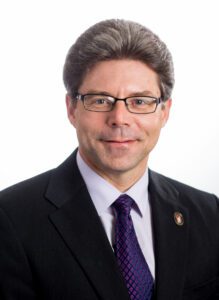
At University of Wisconsin-Madison Continuing Studies, we try hard to prepare people for satisfying jobs. Our Department of Liberal Arts and Applied Studies offers a wide range of courses in professional development, and our Adult Career and Special Student Services provides relevant career advice.

As we all know, it requires hard work to learn the skills that lead to a good job, and more hard work to continue learning new skills once you’ve found a job. But too many people lose sight of what it takes to be happy in their professional lives. We forget that achieving personal fulfillment requires hard work, too.
Life is too short to be unhappy in the workplace, as Annie McKee points out in “Happiness Traps: How We Sabotage Ourselves at Work” (Harvard Business Review, September-October 2017). Nevertheless, the majority of employees in the United States are dissatisfied. McKee cites studies indicating that two-thirds of us are “bored, detached, or jaded and ready to sabotage plans, projects, and other people.” To put it in terms of Abraham Maslow’s hierarchy of needs, they’ve failed to achieve their full potential, falling short of self-actualization.
McKee laments our willingness to accept unsatisfying work and high levels of stress. She identifies three common “happiness traps”: destructive habits that prevent us from finding contentment in our jobs.
A negative spiral
The first trap is being overly ambitious. The desire for great achievements is admirable, within limits. But when it verges into hyper-competitiveness and an obsession with winning, McKee says, “work begins to lose its meaning.” Relationships suffer and collaboration becomes more difficult. Employees focus on their own goals at the expense of the team, the broader organizational mission, and the ultimate client needs and goals.
The second trap is pretending to be someone you’re not. To fit in with workplace culture, norms, and expectations, many employees behave the way they think they should, denying their real selves. McKee cites a Deloitte-sponsored study that found 61 percent of people felt they had to pose in some way to fit in, whether downplaying their race, gender, religion, or sexual orientation. Of course, it takes energy keep up this ruse—energy that would be better spent in productive activities. “Self-suppression and diligent conformity don’t bring out our most original, creative contributions at work,” McKee says.

The third trap is working too hard. This is an all-too-common problem because organizations tend to reward those who overdo it. But ironically, spending endless hours on work often undercuts productivity. “Overwork sucks us into a negative spiral,” McKee writes. “More work causes more stress; increased stress causes our brains to slow down and compromises our emotional intelligence; less creativity and poor people skills harm our ability to get things done.”
How to escape these happiness traps? To McKee, the first step is accepting the fact that it’s possible to find fulfillment at work.
“Work can be a source of real happiness, which I define as a deep and abiding enjoyment of daily activities fueled by passion for a meaningful purpose, a hopeful view of the future, and true friendships,” she argues.
I wholeheartedly agree with that assessment, and I believe organizations can contribute to employee happiness with deliberate strategies. Here at Continuing Studies, we’ve seen hopeful results with some of our recent practices and innovations.
A well-defined mission
McKee’s notion of happiness at work involves a sense of purpose: fighting for something we care about and embracing a compelling vision of the future. At Continuing Studies, we follow this philosophy by putting our mission front and center. On our website, in our performance management guide, and even on our walls is the charge to “advocate for and engage lifelong learners through high-quality and innovative programs and services.” This has become a rallying cry for our employees, along with a way of finding meaning in their work. Gratifyingly, many people come here not only for the salary and benefits, but for the chance to carry out a well-defined mission: helping others achieve their full potential and find meaning via education.

Office climate is a key to “honoring our humanity and fostering common decency,” as McKee puts it. Continuing Studies has instituted a biennial climate survey to gauge employee satisfaction and formed a Climate Committee to review, interpret, and act on the results. Among other initiatives, the Climate Committee has developed “principles for a positive workplace environment” that describe our values in a shared language. The division is currently planning workshops to help employees cultivate the skills for understanding what the principles mean to them and for engaging with one another in a productive way.
Continuing Studies offers staffers other opportunities for personal and professional development. An Inclusive Learning Committee plans activities to foster an environment for learning and understanding with the intent of everyone feeling more acknowledged and respected. A Staff Enrichment Committee organizes sessions on a wide range of topics that deepen employees’ understanding of the world. And regular supervisor trainings explore the latest practices and techniques for managing employees in a humane and professional way.

The journey to fulfillment
As the dean of Continuing Studies, I’m largely responsible for creating the conditions that encourage workplace satisfaction. Along those lines, I make a point of meeting with all new employees to discuss the division’s mission and learn about their hopes for the job. I also meet regularly with a Dean’s Advisory Committee, which keeps me posted on staff concerns so our leadership and operations teams can address issues and tweak processes and procedures. The committee also organizes staff get-togethers to build community and strengthen relationships.
One recent concern involves alternative working arrangements for staffers who require flexibility in their schedules. We’ve begun accommodating such requests where it makes sense, allowing people to work outside the office full or part time.
I hope our efforts at Continuing Studies will help employees embark on what McKee calls “the journey to fulfillment.” After all, we spend too much time at our jobs to settle for anything less than happiness in the workplace.
Jeffrey S. Russell is the University of Wisconsin-Madison’s dean of Continuing Studies and vice provost for Lifelong Learning.